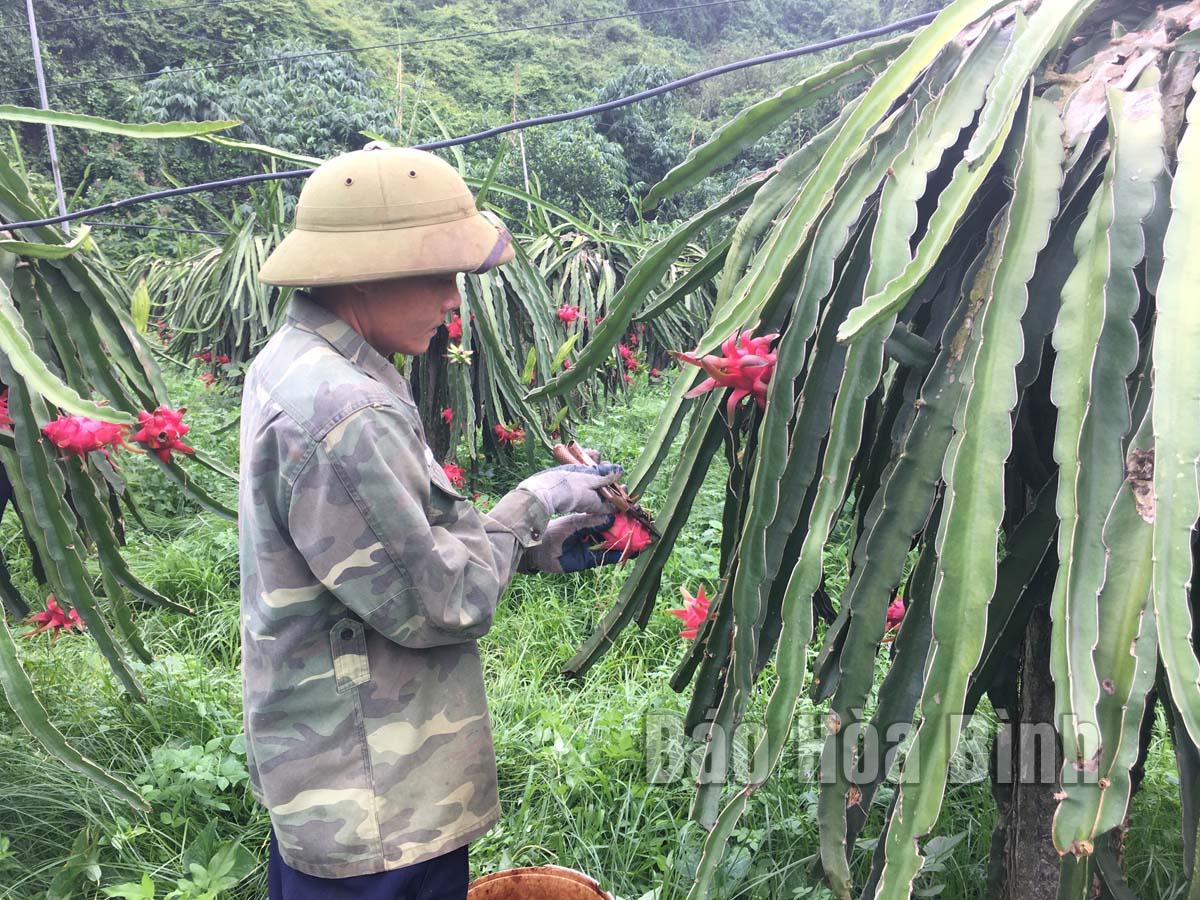
(HBO) – Red-flesh dragon fruit farming has become increasingly popular in Lac Thuy district over the last 10 years. The district now has nearly 56 hectares under the tree, mostly in Ba Hang Doi township and Phu Thanh commune. Productivity is estimated at 18 – 20 tonnes per hectare on average and output reaches 810 – 900 tonnes per year.

A farmer works on his red-flesh dragon fruit farm in Ba Hang Doi township, Lac Thuy.
Red-flesh dragon fruit produced by Thanh Hoa agricultural and service cooperative has been recognised as a three-star "One Commune, One Product” (OCOP) product of the province. It is among the six OCOP products of Lac Thuy made available on e-commerce platforms in an effort to gain broader market access for the district’s farm produce. The district is also planning to expand intensive-farming areas of the fruit.
Ba Hang Doi township alone is home to 26 hectares of red-flesh dragon fruit cultivated by 40 households on T-shaped frames, the latest farming technique, which have not only helped improve productivity but also cut labour costs and generate 4 – 5 crops per year.
However, the farming of the fruit in the district has yet to achieve sustainability as most of the farming areas are on a small scale and the district has not developed a large-scale production zone for the sector. Additionally, seedling quality still varies and application of advanced technology and disease control remain limited.
Head of the district’s division of agriculture and rural development Ngo Dinh Tam said Lac Thuy is seeking a certification for the trademark "Lac Thuy Dragon Fruit” which is expected to finalise this year. It has been raising growers’ awareness of Production Unit Code and Packing House Code, accelerating the granting of the codes, and strengthening the management of the granted codes, he said, adding that these factors are crucial for local dragon fruit to enter foreign markets.
In the long term, the district needs to set sight on dried and juice products from the fruit in order to raise its values, he noted./.
According to data from the Hoa Binh Provincial Party Committee, the industrial production index for the first six months of 2025 is estimated to have increased by 20% compared to the same period last year. This marks the highest year-on-year growth rate for this period since 2020.
In the first six months of 2025, Hoa Binh province’s export turnover was estimated at 1.145 billion USD, marking an 18.11% increase compared to the same period in 2024. Import turnover was estimated at $ 804 million, a 17.15% increase, which helped the province maintain a positive trade balance.
The lives of the ethnic minority farmers in Tan Lac district have gradually improved thanks to the new directions in agricultural production. This is a testament to the collective strength fostered through the professional associations and groups implemented by various levels of the district’s Farmers’ Union.
With the motto the "product quality comes first,” after nearly one year of establishment and operation, Muong village’s Clean Food Agricultural and Commercial Cooperative, located in Cau Hamlet, Hung Son Commune (Kim Boi district), has launched reputable, high-quality agricultural products to the market that are well-received by consumers. The products such as Muong village’s pork sausage, salt-cured chicken, and salt-cured pork hocks have gradually carved out a place in the market and they are on the path to obtaining the OCOP certification.
In the past, the phrase "bumper harvest, rock-bottom prices" was a familiar refrain for Vietnamese farmers engaged in fragmented, small-scale agriculture. But today, a new spirit is emerging across rural areas of Hoa Binh province - one of collaboration, organisation, and collective economic models that provide a stable foundation for production.
Maintaining growing area codes and packing facility codes in accordance with regulations is a mandatory requirement for agricultural products to be eligible for export. Recently, the Department of Agriculture and Environment of Hoa Binh province has intensified technical supervision of designated farming areas and packing facilities to safeguard the "green passport" that enables its products to access international markets.



